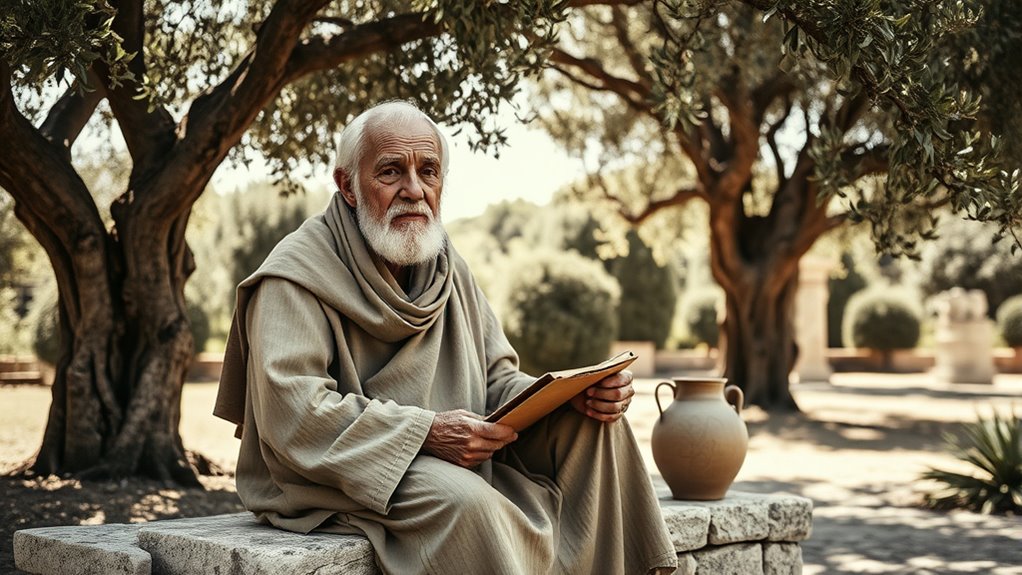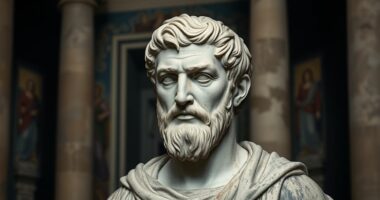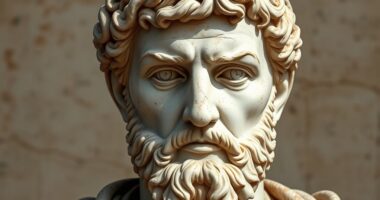Rusticus was a key Stoic philosopher and trusted mentor to Marcus Aurelius, shaping his sense of virtue, discipline, and moral courage. Coming from a noble background, he emphasized integrity, accountability, and living in harmony with nature. Rusticus guided Marcus in practicing honest reflection, resilience, and ethical governance, leaving a lasting impact on his leadership. If you want to discover more about how Rusticus’s teachings influenced Marcus’s reign, keep exploring his life and philosophy.
Key Takeaways
- Rusticus was a prominent Stoic philosopher and mentor who deeply influenced Marcus Aurelius’s ethical and philosophical development.
- He emphasized virtues like honesty, humility, self-control, and moral courage, shaping Marcus’s leadership qualities.
- Rusticus taught practical Stoic meditation techniques, fostering resilience, self-awareness, and disciplined reflection in Marcus.
- His mentorship reinforced the importance of integrity, accountability, and living in accordance with nature and duty.
- Rusticus’s guidance helped Marcus cultivate moral strength, humility, and perseverance amid turbulent political and personal challenges.
The Life and Family Background of Junius Rusticus

Junius Rusticus was a second-century Stoic philosopher whose family background connected him to the influential group known as The Stoic Opposition, a movement dedicated to promoting traditional Stoic values during a time of political and social upheaval.
Your family heritage provided Rusticus with a respected social status that helped shape his character and values. His noble lineage likely afforded him access to education and philosophical circles, reinforcing his commitment to virtue and duty.
This background positioned Rusticus as a figure of integrity, emphasizing the importance of moral standing and tradition in his life. His social status and heritage laid the foundation for his influential role in Stoic philosophy and public service.
Rusticus’s Public Roles and Civic Responsibilities
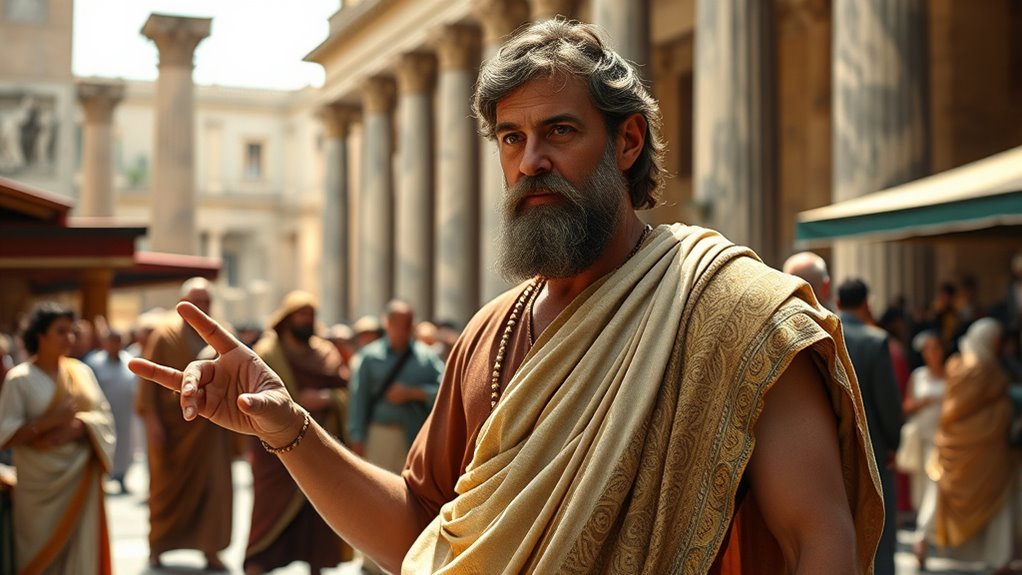
Building on Rusticus’s strong family background and commitment to virtue, he actively engaged in public service, shaping his influence in Roman society. As a magistrate and consul, he oversaw Rome’s legal system and public works, often reflecting on Stoic ethical dilemmas faced during civic duties. His role in maintaining order amid complex issues, like the Justin court case, required balancing justice with compassion, echoing ancient Roman architecture’s blend of strength and harmony. Rusticus’s civic responsibilities exemplify how Stoic principles guided him to serve with integrity, emphasizing duty over personal gain, and inspiring Marcus Aurelius’s leadership qualities. Additionally, his emphasis on color accuracy and precise judgment helped uphold fairness in legal proceedings, demonstrating the importance of clarity and truth in his decisions.
Philosophical Foundations and Stoic Influence
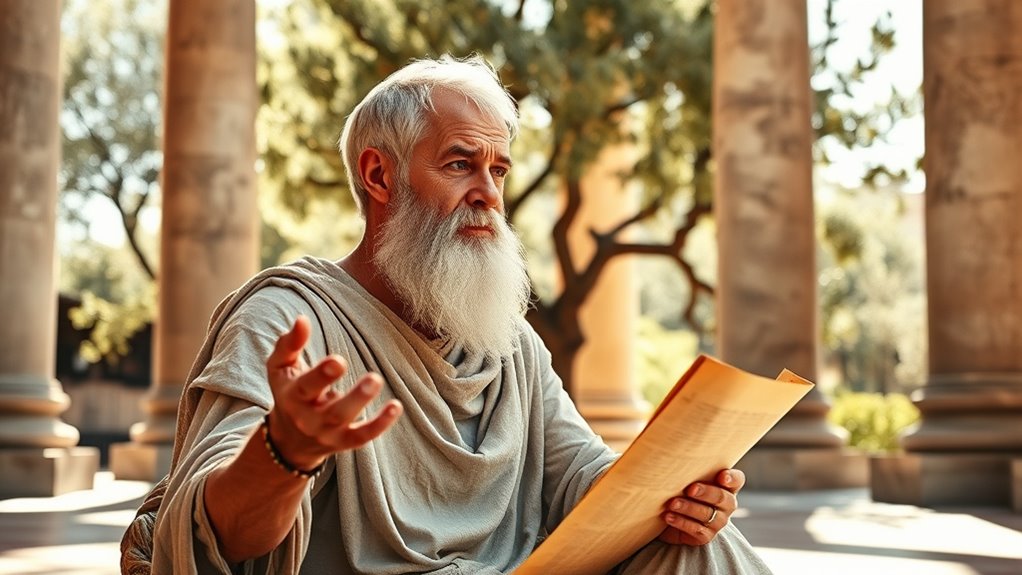
Rusticus’s philosophical foundation was deeply rooted in Stoic principles, which emphasize virtue, reason, and living in harmony with nature. As part of ancient philosophy, Stoic ethics shaped his worldview, guiding his actions and teachings. He also valued modern toilet technology as a means to promote personal hygiene and environmental responsibility, reflecting the Stoic ideal of living in accordance with nature. Additionally, Rusticus appreciated ethical living as a vital aspect of Stoic practice, encouraging personal discipline and integrity. He believed that sustainable practices are essential to fulfilling the Stoic goal of living in harmony with the natural world, reinforcing his commitment to environmental stewardship. His dedication to environmental responsibility exemplifies how Stoic ideals can be integrated with modern concerns for ecological sustainability. By integrating environmental consciousness into his teachings, Rusticus exemplified the importance of ecological responsibility in Stoic philosophy. Rusticus’s influence on Marcus Aurelius reflects these core ideas, fostering a commitment to duty and self-control.
His adherence to Stoic ethics underscores a life dedicated to aligning personal conduct with universal reason, inspiring others to pursue wisdom and virtue through humble reflection and active engagement in society.
Mentoring Marcus Aurelius: Lessons in Virtue and Discipline

As a mentor to Marcus Aurelius, Rusticus imparts essential lessons in virtue and discipline that shape the future emperor’s character. He emphasized understanding Ancient Roman customs, balancing societal duties with personal integrity, and practicing Stoic meditation techniques to develop inner resilience. Rusticus’s teachings encouraged disciplined reflection, attentiveness to honest criticism, and active engagement in public life. These lessons fostered Marcus’s moral strength and clarity. By combining Stoic principles with Roman traditions, Rusticus helped Marcus internalize virtues like humility, self-control, and duty—foundations crucial for leadership and personal growth. Developing analytical thinking was also emphasized as a vital skill for assessing situations and making wise decisions. Additionally, Rusticus’s guidance highlighted the importance of emotional regulation, enabling Marcus to maintain composure during turbulent times and serve as an example of Stoic calmness. Cultivating mindfulness was encouraged to deepen self-awareness and enhance decision-making in challenging circumstances. Furthermore, Rusticus stressed the value of continuous learning to ensure that a leader remains adaptable and wise in the face of evolving challenges. In addition, fostering resilience was seen as key to overcoming setbacks and maintaining moral integrity throughout leadership challenges.
Rusticus’s Approach to Leadership and Public Service

Rusticus believed that true leadership involves more than personal virtue; it requires actively serving the community with integrity and humility. He emphasized leadership ethics, insisting that public officials remain accountable and committed to justice. Rusticus saw public service as a moral duty, not just a position of power. He held leaders responsible for their actions, advocating transparency and honesty. His approach encouraged leaders to prioritize the common good over personal gain. For Rusticus, humility and accountability were essential, ensuring that those in authority acted with virtue and upheld the trust placed in them by society. Incorporating well-being principles, such as proper leadership practices, can help leaders maintain their resilience and effectiveness in serving others. Recognizing the importance of accountability can further strengthen trust between leaders and the communities they serve, especially in fostering a culture of ethical governance and public trust. Emphasizing transparency in decision-making processes can also enhance ethical standards and community confidence.
The Impact of Rusticus’s Guidance on Marcus Aurelius’s Reign

The guidance Marcus Aurelius received from Rusticus profoundly shaped his approach to leadership and personal virtue during his reign. His adherence to ancient philosophy and leadership ethics emphasized integrity, humility, and duty. Rusticus’s influence helped Marcus navigate challenges with honesty and discipline, fostering a leadership style rooted in virtue. Consider how these principles manifest:
| Virtue | Rusticus’s Teaching | Marcus Aurelius’s Application |
|---|---|---|
| Integrity | Honest self-assessment | Unwavering commitment to truth |
| Humility | Welcoming criticism | Leading with modesty |
| Duty | Public service as moral duty | Serving for the common good |
This legacy underscores how mentorship in Stoic philosophy informs enduring leadership ethics. Recognizing moral virtues as essential for effective leadership highlights the importance of cultivating these qualities in oneself and others. Developing an awareness of personal virtues was integral to Marcus’s philosophical outlook and leadership style, fostering spiritual energy that guided his decisions and actions. Additionally, Rusticus’s teachings on self-discipline reinforced Marcus’s resilience in the face of adversity, enabling him to uphold his principles consistently.
Enduring Lessons From Rusticus’S Life and Philosophy

One of the most enduring lessons from Rusticus’s life is the importance of embracing honesty and self-awareness, even when it’s uncomfortable. In the turbulent domain of Ancient Roman politics, staying true to Stoic ethical principles requires integrity and humility. Rusticus demonstrated that facing criticism and acknowledging personal flaws foster growth and virtue. His example teaches you that true leadership involves moral courage, active contribution, and a commitment to truth. By practicing honesty and self-awareness, you cultivate resilience amid chaos, aligning your actions with Stoic ideals. Additionally, Rusticus’s emphasis on personal growth reminds us that consistent self-improvement is essential for virtuous living. Rusticus’s life encourages you to stay grounded in virtue, regardless of external pressures or personal challenges.
Frequently Asked Questions
How Did Rusticus’S Family Background Influence His Philosophical Outlook?
Your family background deeply influences your philosophical outlook by shaping your understanding of social status and moral duty.
Rusticus’s family, linked to The Stoic Opposition, likely instilled values of integrity and resilience, regardless of social standing.
This social influence motivated him to pursue virtue over wealth or power, emphasizing that true worth comes from character and contribution.
His family’s legacy reinforced his commitment to Stoic principles, guiding his actions and teachings.
What Specific Teachings of Epictetus Did Rusticus Pass on to Marcus Aurelius?
You learn that Rusticus passed on key teachings of Epictetus to Marcus Aurelius, emphasizing Stoic perseverance and ethical discipline. He taught him to focus on controlling what’s within his power, remain steadfast amidst challenges, and practice moral integrity daily.
Rusticus also highlighted the importance of honest reflection and humility, urging Marcus to develop resilience and virtue. These lessons helped shape Marcus’s leadership, grounding him in Stoic principles of perseverance and ethical discipline.
How Did Rusticus Balance Public Service With Personal Philosophical Practice?
You see, balancing public duty with personal virtue requires commitment. Rusticus exemplifies this by actively engaging in public service, like serving as consul and overseeing Rome’s affairs, while maintaining his Stoic principles.
He believed that true virtue isn’t just personal; it’s expressed through civic responsibilities. Rusticus’s life shows that fulfilling public roles doesn’t compromise your inner moral integrity—instead, it’s an essential part of living according to Stoic ideals.
In What Ways Did Rusticus’S Character Shape Marcus Aurelius’S Leadership Style?
You might think leadership is all about confidence, but Rusticus proves it’s built on personal integrity and emotional resilience.
His character shaped Marcus Aurelius by modeling humility, honesty, and discipline—traits that foster genuine respect.
Ironically, it’s often vulnerability and steadfastness in tough times that forge true leaders.
Rusticus showed that embracing honesty and maintaining composure under pressure inspired Marcus to lead with wisdom, virtue, and unwavering strength.
What Modern Lessons Can Be Drawn From Rusticus’S Mentorship and Moral Example?
From Rusticus’s mentorship, you learn the importance of practicing mindful resilience, staying steady amid challenges by embracing honest feedback and self-discipline.
His example teaches you to uphold ethical integrity, prioritizing virtue and moral duty over personal gain.
Conclusion
Remember, Rusticus’s mentorship helped shape one of history’s greatest philosophers-king, Marcus Aurelius. Remarkably, over 90% of his Meditations reflects Stoic principles rooted in Rusticus’s teachings. By embodying integrity, discipline, and virtue, you too can influence others and lead with moral strength. His life proves that steadfast guidance and unwavering principles can leave a lasting legacy—showing that true leadership begins with inner virtue and a commitment to the greater good.
